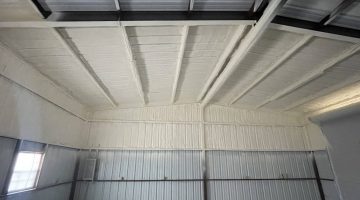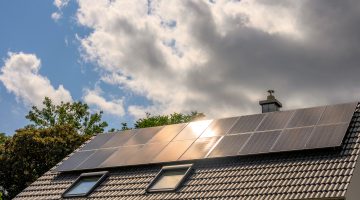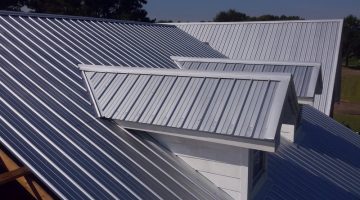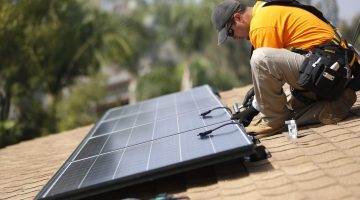
The idea of eliminating or significantly reducing your electrical bill may seem too good to be true, but thanks to advances in renewable energy technology, it’s becoming a reality for many homeowners. Solar energy, once considered a niche market, is now a mainstream solution that offers environmental and financial benefits. With solar panel installations becoming more affordable and efficient, many households are turning to this sustainable option to power their homes. At Helius Roofing & Construction, we specialize in helping homeowners integrate solar panels into their roofing systems, allowing them to take control of their energy consumption and even eliminate their electrical bills.
In this article, we’ll explore how solar panels work, the financial and environmental benefits of switching to solar energy, the process of installing solar panels on your home, and how they can ultimately eliminate or significantly reduce your electrical bill.
1. How Solar Panels Work
Before diving into the benefits, it’s important to understand how solar panels generate electricity. Solar panels are made up of photovoltaic (PV) cells that convert sunlight into direct current (DC) electricity. When sunlight hits the PV cells, the energy from the light excites electrons, creating a flow of electricity. This DC electricity is then converted into alternating current (AC) by an inverter, which is the type of electricity most homes use.
Once the AC electricity is generated, it can be used to power your home’s appliances, lighting, and other electrical systems. If your solar panels generate more electricity than your home uses, the excess energy can be sent back to the electrical grid (depending on your location’s regulations), and in some cases, you may receive credits from your utility company.
2. The Financial Benefits of Solar Panels
One of the most compelling reasons to invest in solar energy is the potential to eliminate or significantly reduce your monthly electrical bill. Here’s how solar panels can help you achieve financial freedom from high energy costs:
a. Immediate Savings on Your Electric Bill
Once your solar panels are installed and operational, they will begin generating electricity for your home. Depending on the size of your solar system and the amount of sunlight your area receives, your panels could produce enough electricity to cover all or a significant portion of your energy needs. This means that instead of relying on your utility company for power, you’ll be generating your own clean energy, reducing your dependency on the grid.
In areas with net metering policies, any excess electricity that your solar panels produce is sent back to the grid, and you can receive credits on your electric bill. These credits can be applied during times when your panels aren’t producing as much electricity, such as at night or during cloudy days. This balancing of energy usage and credits can help bring your electric bill to zero or even generate a surplus of credits.
b. Long-Term Savings and Return on Investment (ROI)
While the initial cost of installing solar panels may seem high, it’s important to consider the long-term financial benefits. The average solar panel system pays for itself within 5 to 10 years, depending on the size of the system, local energy prices, and available incentives. After your system is paid off, you’ll essentially be generating free electricity for the remainder of the solar panels’ lifespan, which can be 25 years or more.
In addition to eliminating or reducing your electrical bill, solar panels can also increase the value of your home. Studies have shown that homes with solar energy systems sell for higher prices than comparable homes without solar installations. This means that investing in solar not only helps you save money on energy costs, but it can also provide a strong return on investment if you decide to sell your home.
c. Tax Incentives and Rebates
Another significant financial advantage of installing solar panels is the availability of tax incentives and rebates. Many federal, state, and local governments offer financial incentives to encourage homeowners to switch to solar energy. For example, in the United States, the Federal Solar Investment Tax Credit (ITC) allows homeowners to deduct a percentage of the cost of installing a solar energy system from their federal taxes. As of 2024, the tax credit stands at 30%, making solar panel installation more affordable.
In addition to the federal tax credit, many states and municipalities offer additional rebates or incentives, such as property tax exemptions or sales tax reductions, which can further reduce the upfront cost of going solar.
3. The Environmental Benefits of Solar Energy
Switching to solar energy doesn’t just benefit your wallet—it also has a profound positive impact on the environment. As concerns about climate change and the environmental effects of fossil fuel consumption continue to grow, solar energy offers a clean, renewable alternative to traditional electricity generation. Here’s how going solar helps protect the planet:
a. Reduction in Greenhouse Gas Emissions
Traditional electricity generation relies heavily on burning fossil fuels such as coal, oil, and natural gas. This process releases harmful greenhouse gases like carbon dioxide (CO2) into the atmosphere, contributing to global warming and climate change. Solar energy, on the other hand, generates electricity without emitting CO2 or other pollutants. By installing solar panels, homeowners can drastically reduce their carbon footprint and contribute to the fight against climate change.
According to the U.S. Environmental Protection Agency (EPA), the average household can reduce its carbon emissions by approximately 3 to 4 tons annually by switching to solar energy. Over the lifetime of a solar system, this can add up to a significant reduction in greenhouse gas emissions, helping to mitigate the effects of climate change.
b. Conservation of Natural Resources
Fossil fuels are finite resources that take millions of years to form. By relying on solar energy, which is abundant and renewable, we reduce the demand for these limited natural resources. Solar panels harness the energy from sunlight, which is available every day and will continue to be a sustainable source of power for generations to come.
Additionally, solar energy systems don’t require water for electricity generation, unlike many traditional power plants, which use vast amounts of water for cooling purposes. By switching to solar, homeowners can help conserve precious water resources, particularly in regions prone to drought.
4. The Solar Installation Process
At Helius Roofing & Construction, we make the solar installation process as seamless as possible for homeowners. Here’s what you can expect when you decide to install solar panels:
a. Initial Consultation and Roof Assessment
The first step in the solar installation process is to schedule a consultation with our team. During this meeting, we’ll assess your home’s roof to determine its suitability for solar panels. We’ll look at factors such as the roof’s orientation, pitch, and shading to ensure that your roof can effectively capture sunlight.
If your roof needs repairs or reinforcement before the solar installation, we can handle those upgrades as part of our comprehensive roofing services.
b. Custom Solar System Design
Based on the roof assessment and your household’s energy needs, we’ll design a custom solar energy system that maximizes efficiency and savings. Every home is different, so we tailor each system to ensure that it meets your specific requirements.
c. Permitting and Installation
Once the system design is finalized, we’ll handle all necessary permitting and paperwork to ensure that your installation complies with local building codes and regulations. Our team of expert installers will then install the solar panels on your roof, along with any necessary electrical components, such as inverters and meters.
The installation process typically takes a few days, depending on the size of the system and the complexity of the installation. After the system is installed, it will be connected to the electrical grid, and any net metering arrangements will be set up with your utility company.
d. Monitoring and Maintenance
After your solar panels are installed and connected, we’ll provide you with tools to monitor your system’s performance. Many solar systems come with apps or online platforms that allow homeowners to track how much energy their panels are generating and how much electricity they’re using.
Solar panels require minimal maintenance, but regular inspections can ensure that they continue to operate efficiently. At Helius Roofing & Construction, we offer maintenance services to keep your system in top shape and ensure that you’re getting the maximum benefit from your investment.
5. Conclusion: Achieving Energy Independence
By embracing solar panels, homeowners can take control of their energy consumption, reduce their carbon footprint, and eliminate or significantly reduce their electrical bills. At Helius Roofing & Construction, we are dedicated to helping you make the transition to solar energy with ease and confidence. With the financial benefits of lower energy costs, tax incentives, and the environmental impact of reducing greenhouse gas emissions, solar power is a smart investment for your home and the planet. Solar energy offers a path to energy independence, helping you save money while contributing to a cleaner, more sustainable future for all.











